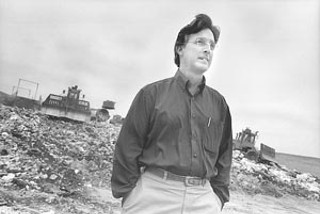Trashing the Trash Rules
Texas Commission on Environmental Quality recently adopted the most significant rewrite of the state's garbage rules in a decade
By Daniel Mottola, Fri., March 24, 2006

The Texas Commission on Environmental Quality adopted the most significant rewrite of the state's garbage rules in a decade on March 1, but not before making several debated last-minute changes that some onlookers believe were guided by the hand of the waste industry, which was already faring rather well in the new rule package.
The rules also passed against the recommendation of the state-Legislature-appointed Municipal Solid Waste Management and Resource Recovery Advisory Council, whose members asked for more time to work the bugs out of rule language and to gain input. The council, broadly representative of the waste industry, was organized to review policy and make recommendations to TCEQ commissioners. Council President Bob Gregory said the rules were "not ready to be finalized," and warned of the unintended consequences of possible misinterpretation and loopholes, given that so many regulations were reworded.
"The council believes the public, the regulated community, and the TCEQ staff have not had adequate time or adequate notice to respond to all the comments received, fine tune the proposed language, and identify the impacts of the proposed rule changes," reads an advisory council document dated Feb. 27, three days before the rules were approved.
Notable new regulations include increased buffer zones around refuse facilities from 50 to 125 feet, requirements that groundwater-pollution detection wells be a minimum of 600 feet apart unless a facility operator can scientifically demonstrate otherwise, the consideration of added floodplain data in addition to FEMA maps with respect to finding sites for new landfills, and a requirement that landfill expansions at older sites without groundwater-protecting clay liners have the liners installed before new dumping is permitted, even though most large existing sites will be grandfathered from the new rules since they've already put in their applications for expansion. Additionally, TCEQ will give local pollution-control agencies violation notifications for nearby sites upon request and will require Internet, as well as sign postings, for new and expanding sites. The commission dropped from the rules; however, a provision calling for five-year waste-facility-permit reviews to ensure compliance. Also, the TCEQ won't consider or approve permits for bioreactors, facilities that essentially wet garbage to speed up decomposition. Liquid-waste or grit- and grease-trap facilities and transfer stations were exempted from the larger buffer zone rules, and construction and demolition waste landfills, aka Type 4 landfills, were exempted from new buffer-zone and groundwater-monitoring rules.
In an e-mailed statement, TCEQ spokesman Terry Clawson fired off a series of ways the agency believes "the new rules will further strengthen environmental protections." But Robin Schneider, director of landfill watchdog and environmental nonprofit Texas Campaign for the Environment, complained that the amendment process that led to some last-minute rule changes was not accessible to the public. She also expressed surprise at the exemption of Type 4 landfills (of which Austin has two).
Texas Campaign for the Environment pushed for rules addressing old landfills seeking to expand vertically over unlined ground, after battling for years alongside Northeast Travis Co. neighborhood groups for the immediate closure of two old and problematic landfills run nearby by BFI and Waste Management of Texas – both of which are now seeking vertical-expansion permits. The new rules address the expansion issue, but the two northeast landfills – along with 19 others seeking to expand statewide – will be exempt from those rules, unless they choose to abide by them voluntarily, since the flood of permit applications filed in anticipation of the rule changes will be processed before the rules take effect at the end of the month. "We got something in the stocking, but [the industry] got lots of presents under the tree," Schneider said.
Vance Kemler, director of solid waste management for the city of Denton and president of Texas' chapter of the Solid Waste Association of North America, sees the changes entirely differently, noting that they "were generally an improvement over the old rules." Referring to claims from citizens that some late rule changes were shady, Kemler said that "of those topics, not a single one was not discussed in a stakeholder meeting the previous month," and added that he "didn't think the private solid-waste industry got any special consideration." Kemler agreed with the pulling of certain items, which he said would hopefully be addressed in the near future. He also noted that every single rule isn't going to meet the criteria of every group involved.
Gregory, CEO of Texas Disposal Systems, which operates a landfill and composting facility southeast of Austin, said several of the new enforcement policies boil down to the agency's integrity, or lack thereof. "There has been little TCEQ enforcement holding [landfill] operators to the rules of their permits," he said, and operators have a history of blaming violations on unclear rules. "Now the rules are less clear," he says. "Maybe that's the reason the trash companies pushed so hard for them."
Got something to say on the subject? Send a letter to the editor.








